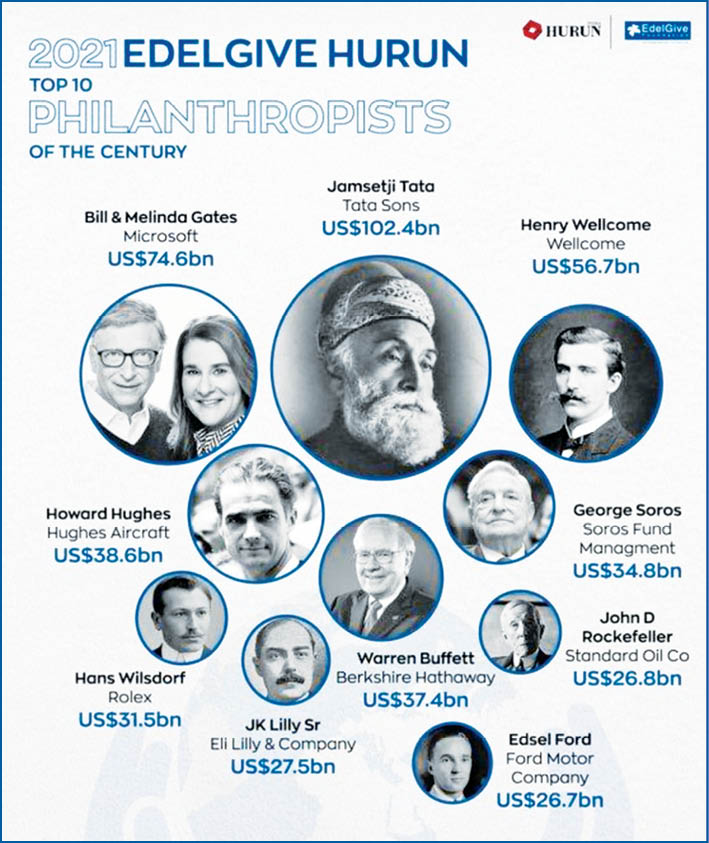 The legacy and glory of our illustrious forefathers continue to bring pride and worldwide reverence to our small community, even today! Jamsetji Nusserwanji Tata, the late founder of the Tata Group, topped the prestigious ‘2021 EdelGive Hurun Philanthropists of the Century’ rankings, with his donations currently valued at $102.4 Billion, including all his key endowments, since 1892, primely focusing on education and healthcare. Jamsetji Nusserwanji Tata is the only Indian who made it to the Top Ten in this list. The debut report was unveiled by Hurun Research and EdelGive Foundation earlier this week.
The legacy and glory of our illustrious forefathers continue to bring pride and worldwide reverence to our small community, even today! Jamsetji Nusserwanji Tata, the late founder of the Tata Group, topped the prestigious ‘2021 EdelGive Hurun Philanthropists of the Century’ rankings, with his donations currently valued at $102.4 Billion, including all his key endowments, since 1892, primely focusing on education and healthcare. Jamsetji Nusserwanji Tata is the only Indian who made it to the Top Ten in this list. The debut report was unveiled by Hurun Research and EdelGive Foundation earlier this week.
Other Indians among the Top 50 include Azim Premji, former Wipro Chairman, ranked 12th. Bill and Melinda French Gates, Henry Wellcome, Howard Hughes and Warren Buffett are among the Top 5. Rankings are based on Total Philanthropic Value, calculated as the value of the assets adjusted for inflation, along with the sum of gifts or distributions to date. The data was derived from publicly available sources or those directly shared by the foundations.
Regarded as the legendary ‘Father of Indian Industry’, Jamsetji Tata set up and revolutionised the cotton and pig iron industry, establishing Tata Steel in Jamshedpur (then known as Tata Iron and Steel Works Company or TISCO) in 1907. Today, Tata Steel operates in 26 countries with a commercial presence in over 50 countries with over 80,000 employees, across five continents! As per the ‘EdelGive Hurun Philanthropists of the Century’ report, Tata’s total philanthropic value comprises 66% of Tata Sons, estimated at $100 billion, based purely on the value of listed entities.
The report further shared that the world’s 50 most generous individuals in the last century came from five countries – overwhelmingly led by the US (39) followed by the UK (5), China (3), India (2), Portugal (1) and Switzerland (1). Their total donations amount to $832 billion, of which $503 billion are from foundation endowments and $329 billion have been disbursed in the last century. New York was termed as the philanthropy capital of the world as 10 out of the 50 foundations were based there. On an average, most foundations were close to 60 years, with Tata’s being the oldest, set in 1892.
Rupert Hoogewerf, Chairman and Chief Researcher of Hurun Report, said, “Whilst American and European philanthropists may have dominated the thinking of philanthropy over the last century, Jamsetji Tata, founder of India’s Tata Group, is the world’s biggest philanthropist.”
So influential was Jamsetji Tata in the world of industry that Jawaharlal Nehru referred to him as a ‘One-Man Planning Commission’. In a fitting tribute to the legendary man, Jawaharla Nehru has said, “When you have to give the lead in action, in ideas – a lead which does not fit in with the very climate of opinion – that is true courage, physical or mental or spiritual, call it what you like, and it is this type of courage and vision that Jamsetji Tata showed. It is right that we should honour his memory and remember him as one of the big founders of modern India.”
Jamsetji Tata was born in a poor priestly family, to Nusserwanji and Jeevanbai Tata on 3rd March, 1839 in Navsari, Gujarat. His father started an export-trading firm, as the first entrepreneur in the family. Recognising his aptitude for special mental arithmetic at a young age, Jamsetji’s parents got him a formal Western education, later sending him to Bombay, where he enrolled at the Elphinstone College.
He then joined his father’s export-trading firm, and helped establish strong branches in Japan, China, Europe and the US. In China, he realized that the cotton industry was booming and sensing great profitability, he invested largely in cotton mills, making it a thriving business.
He had four goals in life – to set up an iron and steel company, a world-class learning institution, a unique hotel and a hydro-electric plant. Only the hotel became a reality during his lifetime, with the inauguration of the Taj Mahal Hotel at Colaba sea-front (Mumbai) in December, 1903 at the cost of ₹11 million (then), and was supposedly the only hotel in India to have electricity! His successors’ realised his three remaining goals, establishing: ‘Tata Steel’ (formerly TISCO, Asia’s first and India’s largest steel company; the world’s fifth-largest steel company today); ‘Indian Institute of Science’ (based in Bengaluru, it is the pre-eminent Indian institution for research and education in Science and Engineering); and Tata Hydroelectric Power Supply Company, renamed ‘Tata Power Company Ltd’, currently India’s largest private electricity company.
Tata’s iron and steel plant was set up at Sakchi village in Jharkhand. The village grew into a town and the railway station there was named Tatanagar. Today it is a bustling metropolis in Jharkhand, named ‘Jamshedpur’ in his honour.
Jamsetji married Hirabai Daboo while he was still a student. Their sons, Dorabji Tata and Ratanji Tata, succeeded Tata as the Chairman of Tata Group. On a business trip to Germany in 1900, Tata fell gravely ill and passed away in Bad Nauheim on 19th May, 1904. He was buried in the Parsi burial ground in Brookwood Cemetery, Woking, England.
